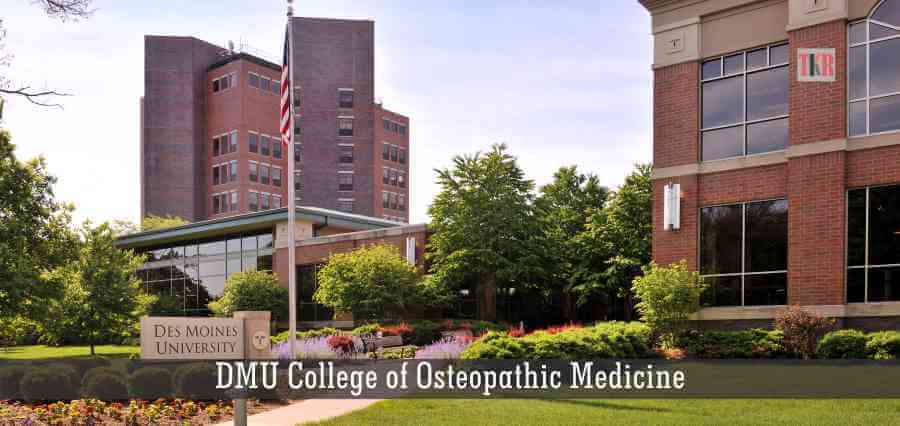The college aims to develop distinctive health professionals committed to health promotion, the discovery of knowledge, and service to the community
Founded in 1898, Des Moines University (DMU) comprises three colleges offering eight graduate degrees. It is a health sciences university that added the colleges of health sciences and pediatric medicine and surgery in 1981. The programs share a collective strength – a collaborative campus community where students and faculty come together in the pursuit of knowledge. Des Moines University offers degree programs in medicine and the health sciences.
The College of Osteopathic Medicine (COM) has maintained a tradition of dynamic growth and academic excellence. The college continues to focus on the future by developing outstanding osteopathic physicians to provide health care to the people of Iowa and the nation.
Prominent Academic and Infrastructure Facilities
The university delivers an exceptional academic experience with their expert, caring faculty; a rigorous, relevant curriculum; state-of-the-art facilities; a dynamic and diverse research environment; and a vibrant community of students and faculty active in learning and service.
They prepare students to become primary care physicians or to practice in specialty areas such as surgery, obstetrics/gynecology, cardiology, psychiatry, emergency medicine, and many others. The rigorous curriculum and state-of-the-art facilities give students the preparation needed for success. DMU pass rates on COMLEX board exams consistently exceed the national average, and it has turned in greater than a 99.5% residency match rate for each of the last five years.
Doctor of Osteopathic Medicine (DO) students are trained in Osteopathic Manual Medicine (OMM), which is an orientation toward patients and their health problems using non-invasive touch as central to diagnosis and treatment.
OMM is an additional set of skills and competencies that only osteopathic physicians are trained to provide. This distinguishing skill set is used to both evaluate and treat the neuromusculoskeletal system — from the feet through the pelvis, spine, head, and upper extremities. OMM is incorporated throughout the four years of study.
The DMU Family Medicine Department is dedicated to applying the skills of the experienced primary care providers to teaching the osteopathic students of today how to become the competent osteopathic physicians of tomorrow. Along with the Family Medicine Department’s primary responsibility of teaching the students of the College of Osteopathic Medicine, the college also helps train students throughout the three colleges at DMU: College of Health Sciences, College of Osteopathic Medicine, and College of Podiatric Medicine and Surgery.
Exhaustive Training Procedures
Students in the osteopathic medicine, podiatric medicine, physician assistant, and physical therapy programs receive part of their training on campus through the Des Moines University Clinic, which offers primary care and medical specialties and serves as a regional referral center.
The University’s commitment to wellness extends beyond educational programs to the delivery of health care. Students and faculty provide free health services and screenings to the community through charity events, sporting events, and corporate wellness programs.
Des Moines University has educated thousands of health care professionals and will continue to prepare physicians and allied health professionals for careers in the ever-changing field of medicine and health sciences while developing innovative programs to serve students and society.
Quick Facts about DMU
- Nearly 1,800 students are enrolled across 8 graduate degree programs.
- DMU is the largest medical school in Iowa with more than 880 students in the osteopathic medical program.
- The very first medical class in 1898 included both sexes and today 44 to 45% of the student body are women.
- 71% of students are recruited from states outside of Iowa.
- DMU has over 14,000 alumni.
- DMU is one of the top 25 largest medical schools (for D.O.s or M.D.s) in the nation, out of 181 accredited schools.
- DMU students and employees serve the community in a wide variety of ways, from free on-campus events like the annual Senior Health Fair and Girls Exploring Medicine & Science to off-campus health screenings, osteopathic manual medicine treatments, health education programs and many more volunteer activities.
Financial Assistance and Career Opportunities
The college also provides financial support to the students. They have received more than $6.3 million in scholarships in the academic year 2017-18. Students graduating from DMU’s College of Osteopathic Medicine advance to become physicians, researchers, educators, policy advisors, and more. DMU offers many ways to maximize student’s time in medical school. Students and faculty conduct research on a variety of topics and present at regional and national conferences. The Global Health Program offers short-term service trips internships and rotations at sites around the world. Students also have the opportunity to combine their DO degree with a master’s in public health, health administration, anatomy, or biomedical sciences.









